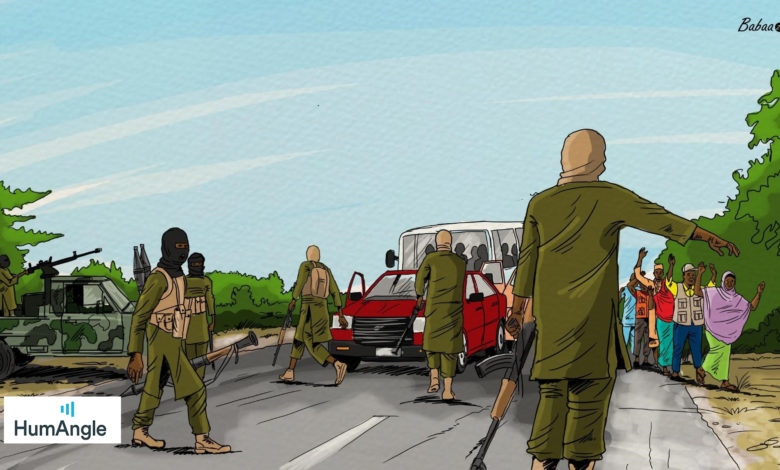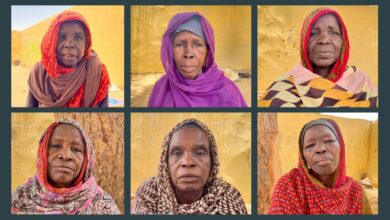#BokoHaram Roadblocks, Ambushes In Borno Claiming Prime Targets

On Sunday, September 20, insurgents mounted a roadblock on the road leading to Maiduguri from Monguno town, in Monguno Local Government Area, Borno State, northeast Nigeria. Monguno is 130 kilometres northeast of Maiduguri. State officials from the Ministry of Health in Maiduguri were among the travellers on the road that day.
The health officials were on assignment to fumigate internally displaced persons camps in the garrison town. When these particular travellers got to the roadblock, it was already too late when they realised they were in the hands of insurgents.
The roadblock, mounted by fighters of one of the splinter groups of Boko Haram, recognised as the Islamic State West Africa Province (ISWAP), served as abduction point. The gunmen immediately seized all the occupants of the vehicle and killed two soldiers escorting the officials.
On Monday, 21 September 2020, the Brigade Commander of 25 Task Force Brigade of the Nigerian Army, Colonel Dahiru Bako died from injuries sustained after ISWAP ambushed his patrol team in northern Borno.
Last week ISWAP also abducted five employees of the Borno State Ministry of Reconstruction, Rehabilitation and Resettlement. Similar to the attack in Monguno, this incident occurred at a roadblock mounted by ISWAP in Kareto, Damasak Local Government Area some 150 kilometres northwest of Maiduguri.
According to intelligence reports sighted by HumAngle, about 90 per cent of all Boko Haram captives in 2020 were abducted on the highways. The report also highlighted that less than 10 per cent of all the abductions occur during raids on communities.
The two major factions in the insurgency, Jama’atu Ahlis Sunna Lidda’awati Wal-Jihad and the Islamic State’s West Africa Province (ISWAP), have recently resorted to daily ambushes of military convoys and civilian travellers.
The horrors of these violent crimes include robbery, abduction, burning vehicles and summary execution, depending on the profile of their victims. “They do not spare security officials. Local traders are robbed, while visitors to the area, NGO workers, state officials and students are abducted,” confided a driver who is familiar with the incidents to HumAngle.
According to the driver, “we are rarely attacked by them, once you look and act like a villager and they don’t see you as someone that can undermine them, you are likely going to be left alone.”
Daily, residents of Borno have to make the difficult choice to either travel by road with the accompanying risks or stay only in the state capital, Maiduguri or some parts of Southern Borno that remains the only safe place in the state.
All the highways connecting to Maiduguri remain dangerous, particularly in the night reported residents in the state. Boko Haram seems to encircle Maiduguri, waiting for an opportunity to attack, said multiple sources.
HumAngle gathered that in the past three months, more than 200 persons had been abducted and hundreds of road travellers robbed along Damaturu-Maiduguri, Monguno-Maiduguri, Maiduguri-Damboa-Biu and Maiduguri-Ngala highways despite frequent military patrols along these routes.
According to a leader of the vigilante forces in Maiduguri, “there is rarely a day that the terror groups will not set up roadblocks to check the identities of road users in a vehicle. For instance, on the Maiduguri – Monguno road, a major flashpoint is a village called Yoyo and another spot at Ari Gombore.” He told HumAngle that almost all the ambushes on the route happen in locations that are known to all.
The second most dangerous road, according to several commercial drivers in Maiduguri is the Damasak route. The deadliest road is Ngamboru Ngala where most of the attacks are linked to the Abubakar Shekau faction of Boko Haram. “They cut convoys into half, rob people and burn down the vehicles, killing some of the passengers and leaving others stranded,” said a driver.
Boko Haram fighters are familiar with the fact that the military escorts of two to three military mounted gun trucks and military vans only lead the convoy of dozens or hundreds of vehicles in the front row.
HumAngle gathered that the terrorists regularly hit the convoys from the middle and those in the front with the military escorts do not usually stop. They continue their trip to safety. Those cut off are robbed, abducted, maim or killed.
In December 2019, the United Nations Humanitarian Coordinator in Nigeria, Edward Kallon, expressed concern over the increasing number of roadblocks set up by non-state armed groups along main supply routes in the states of Borno and Yobe.
“These checkpoints expose civilians and humanitarians to heightened risks of being killed or abducted,” he lamented.
Editor’s note: This report was updated on September 26, 2020, to correct the statement that officials of Action Against Hunger were abducted by insurgents between the 10th and 12th September 2020. New facts obtained by HumAngle indicate that was not the case as the humanitarian agency is able to account for all its workers, none of whom have been victims of abduction in the past month.
Support Our Journalism
There are millions of ordinary people affected by conflict in Africa whose stories are missing in the mainstream media. HumAngle is determined to tell those challenging and under-reported stories, hoping that the people impacted by these conflicts will find the safety and security they deserve.
To ensure that we continue to provide public service coverage, we have a small favour to ask you. We want you to be part of our journalistic endeavour by contributing a token to us.
Your donation will further promote a robust, free, and independent media.
Donate Here




